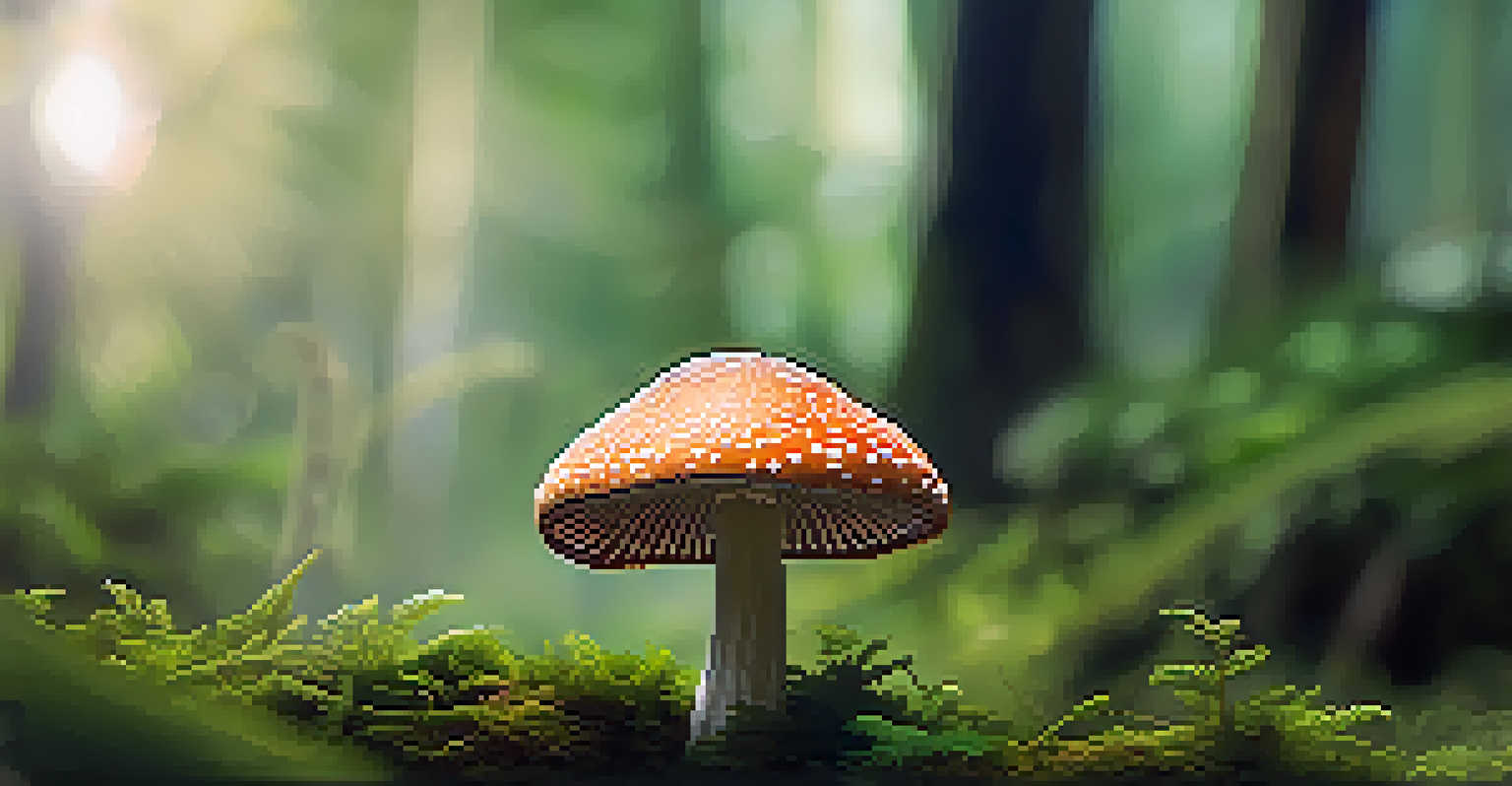Ancient Wisdom Meets Modern Neuroscience: Healing with Entheogens

Understanding Entheogens: A Brief Overview
Entheogens are substances that have been used for centuries in various cultures to induce altered states of consciousness. These compounds, often derived from plants, are believed to facilitate spiritual experiences and personal insights. Popular examples include psilocybin mushrooms, ayahuasca, and peyote, each with a rich history of use in rituals and healing practices.
Psychedelics can help people see their problems from a different perspective, allowing them to confront their fears and anxieties head-on.
In many indigenous cultures, entheogens are considered sacred and are used to connect with the divine or the self. The word 'entheogen' itself means 'generating the divine within,' highlighting their role in spiritual exploration. This historical context provides a fascinating backdrop for understanding their potential therapeutic applications today.
As modern science begins to explore these ancient practices, researchers are uncovering how entheogens may influence brain function and emotional well-being. By bridging the gap between tradition and modernity, we can gain a deeper appreciation for how these substances might aid in healing.
The Neuroscience Behind Entheogens
Recent studies have shown that entheogens can significantly alter brain activity and connectivity. For instance, substances like psilocybin impact serotonin receptors, which play a crucial role in mood regulation. This neurochemical interaction suggests that entheogens could help alleviate conditions like depression and anxiety by fostering new neural pathways.

In addition to mood enhancement, entheogens have been linked to increased emotional processing and introspection. During a psychedelic experience, users often report heightened emotional awareness and an enhanced ability to confront personal issues. This introspective journey can lead to profound insights, making it a valuable tool in therapeutic settings.
Entheogens Aid Mental Health
Research shows that entheogens like psilocybin can significantly improve mood and emotional well-being.
Moreover, researchers are exploring how these substances can facilitate neuroplasticity—the brain's ability to reorganize itself by forming new connections. This characteristic is particularly promising for individuals recovering from trauma or addiction, as it may enable them to reshape their thought patterns and behaviors.
Ancient Healing Traditions and Practices
For thousands of years, various cultures have utilized entheogens in healing rituals. For example, indigenous Amazonian tribes have long used ayahuasca in ceremonies to promote physical and spiritual healing. These practices often involve guided experiences led by shamans, who help participants navigate their journeys safely.
The experience of entheogens can bridge the gap between mind and body, fostering a deeper connection to self and others.
The communal aspect of these ceremonies plays a vital role in the healing process. Sharing experiences with others fosters a sense of connection and support, which can be incredibly therapeutic. This collective approach contrasts with the often solitary nature of modern psychiatric treatments, highlighting the importance of community in healing.
Additionally, many of these ancient practices emphasize the significance of intention and mindfulness. Participants are encouraged to approach their experiences with an open heart and mind, which can enhance the therapeutic potential of entheogens. This holistic perspective is increasingly being recognized in contemporary mental health treatment.
Current Research and Clinical Trials
In recent years, there has been a resurgence of interest in entheogens within the scientific community. Numerous clinical trials are underway to evaluate their effectiveness for various mental health disorders. For instance, studies on psilocybin have shown promising results for treating depression and PTSD, paving the way for its potential acceptance in mainstream medicine.
These trials often involve controlled environments where participants receive doses of entheogens alongside psychotherapy. This combined approach seems to enhance therapeutic outcomes, as the psychedelic experience can help individuals confront and process underlying issues more effectively. Researchers are excited about the implications of these findings for the future of mental health treatment.
Ancient Practices Inform Modern Therapy
Integrating traditional healing rituals and community support can enhance contemporary therapeutic practices.
However, it's essential to approach this research with caution. While the results are encouraging, further studies are needed to understand the long-term effects and potential risks associated with entheogen use. As the conversation about entheogens continues to evolve, balancing scientific inquiry with traditional wisdom will be crucial.
Legal and Ethical Considerations
As interest in entheogens grows, so too do the discussions surrounding their legal status and ethical use. Many countries still classify these substances as illegal, creating barriers for research and therapeutic application. Advocates argue that re-evaluating these laws could unlock significant healing potential for those suffering from mental health issues.
On the ethical front, ensuring safe and responsible usage is paramount. With the rise of interest in self-guided psychedelic experiences, there’s a pressing need for education about safe practices and potential risks. Responsible use involves understanding one's mental health history and having the right support system in place.
Moreover, it's essential to respect the cultural heritage of indigenous communities that have historically used these substances. Engaging with these traditions ethically and respectfully can enhance our understanding of entheogens and their place in modern society. This dialogue is critical as we navigate the intersection of ancient wisdom and contemporary science.
Integrating Ancient Wisdom into Modern Therapy
As we explore the healing potential of entheogens, integrating ancient wisdom into modern therapeutic practices becomes increasingly relevant. This integration could involve adopting traditional practices, such as guided ceremonies or community support, into contemporary treatment plans. By blending these approaches, we can create more holistic healing experiences for individuals.
Additionally, mental health professionals are beginning to recognize the value of incorporating mindfulness and intention-setting into their work. Techniques drawn from ancient practices can enhance the therapeutic process and foster deeper emotional connections between therapists and clients. This shift toward a more inclusive approach could lead to more effective and meaningful healing.
Legal and Ethical Challenges Ahead
The rise in interest for entheogens raises important discussions around their legal status and responsible usage.
Ultimately, the goal is to create a therapeutic landscape that honors both the scientific and the spiritual. By valuing the insights of ancient cultures while embracing modern neuroscience, we can pave the way for innovative healing practices that resonate with a diverse range of individuals.
The Future of Healing with Entheogens
The future of healing with entheogens is bright, with ongoing research and evolving societal attitudes paving the way for broader acceptance. As more studies demonstrate their effectiveness, we may soon see these substances integrated into mainstream mental health treatment. This shift could revolutionize the way we approach mental health care, offering new hope to those in need.
Moreover, the conversation around entheogens encourages us to rethink our understanding of healing itself. Instead of solely focusing on symptom alleviation, we can begin to explore deeper aspects of self-discovery and spiritual growth. This holistic perspective aligns with many ancient practices, emphasizing the importance of the mind, body, and spirit in the healing process.

As we continue to learn from both ancient wisdom and modern science, the potential for transformation in mental health care is immense. By fostering a culture of openness and exploration, we can create a future where entheogens play a vital role in healing and personal growth.